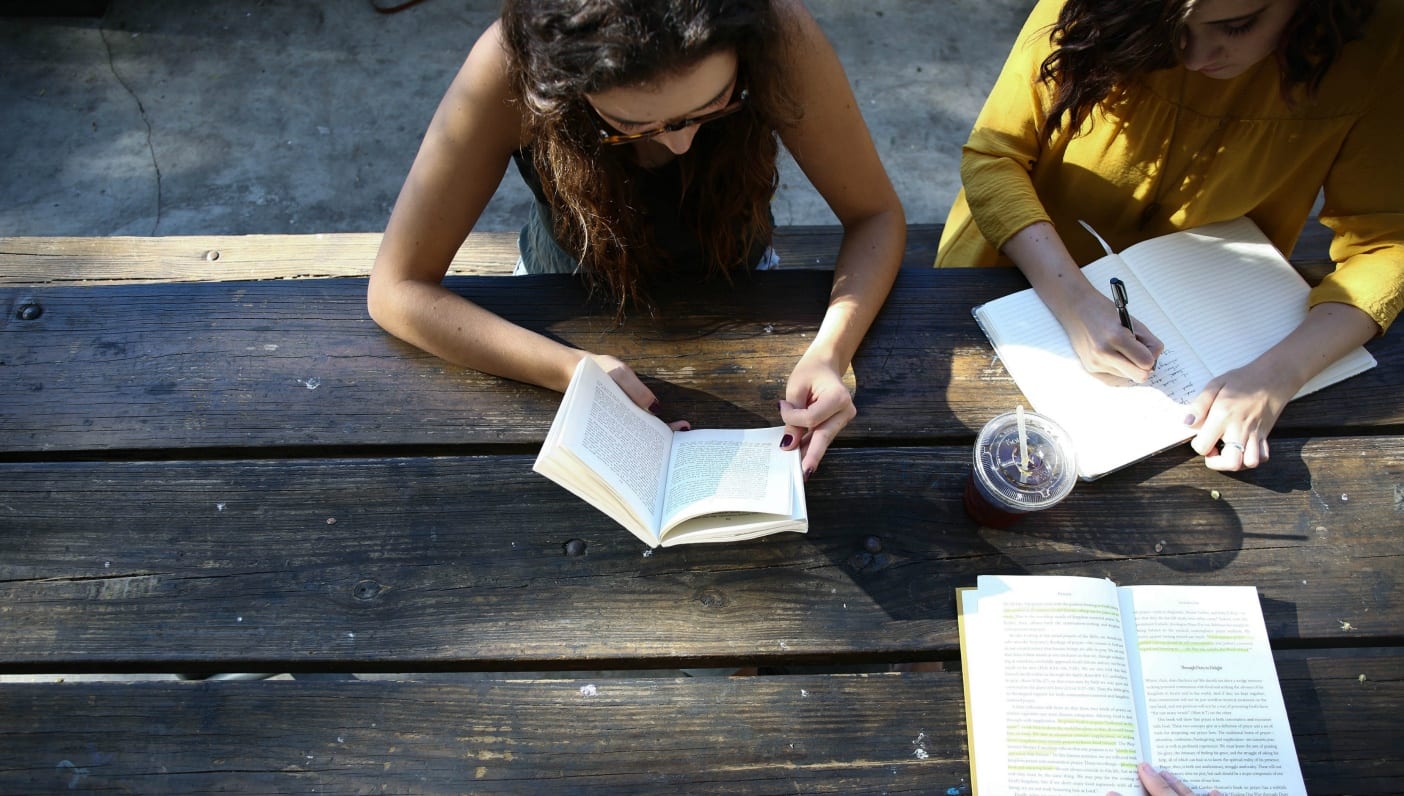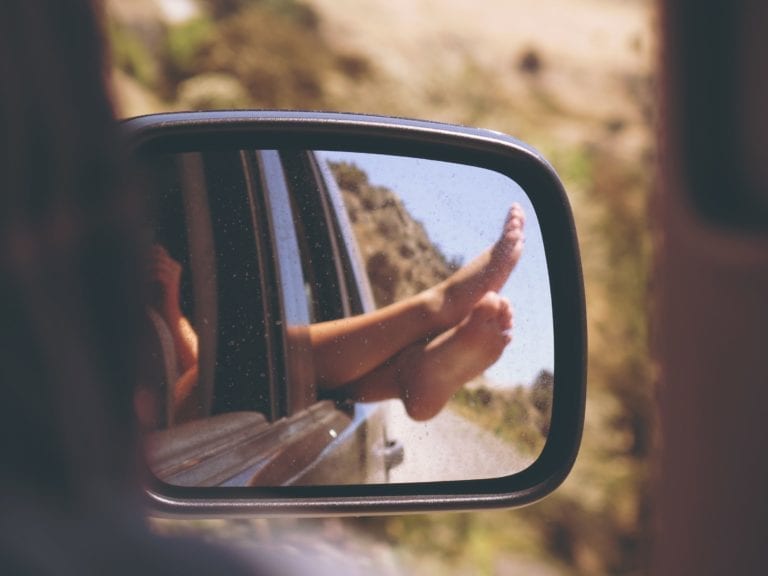
When Jess Davis and I were first scheduled to chat, I didn’t get an answer. I knew that she was planning to spend the day in the woods, and figured it was a reception issue. It’s an appropriate issue for Jess to have—as the founder of Folk Rebellion, a media and lifestyle brand advocating for offline living—a lack of cell reception kind of comes with the territory. When I spoke with her a few days later, she gushed about her experience in a Getaway cabin, a new-ish company founded to help city folks develop a personal relationship with the great outdoors. Jess had been running around for the previous couple of weeks, stressed and overworked, and had gotten sick. Jess’s friend and founder of Getaway insisted she come and stay in a cabin, completely off-grid.
Unplugging for a few days was just what the doctor ordered—though it came as no surprise to Jess. A former award-winning brand strategist who thrived for 10 years in a fast-paced, tech-heavy world, Jess had a reckoning that while she’d helped to create a world that was digitally connected, the flip side was a sincere disconnection from the actual, tangible world. She founded Folk Rebellion to help others like her develop a sense of digital wellness and a healthy relationship with their devices.
WTF is Digital Wellbeing?
“Five years ago, digital detoxing was a way to start the conversation,” says Jess, but notes that an absolute approach may not be the healthiest way to go about digital wellness today. The digital revolution isn’t comparable to something like cigarettes, for example, when it comes to being healthy.
“Technology is an amazing tool when used appropriately. For me, it’s digital wellbeing,” she says. “The same way you have wellbeing with nutrition and with exercise, I think that the next form of wellbeing is being digitally well. You can’t rush to yoga, have your juice, take your supplements, and be well if you don’t have a healthy relationship with your technology and your devices,” she says.
Jess likens the evolution of digital wellness to the seatbelt revolution in the 1980s. Cars were, point blank, unsafe—and auto manufacturers were reluctant to spend the money to revamp their factories. Ralph Nader led the charge to change mindsets: It wasn’t cars that were dangerous, it was the cars without safety precautions. He successfully lobbied for seat belts, airbags, and stop signs.
“I’m not saying that the tech is bad and we need to go without it completely,” says Jess, “but if we don’t start adding some stop signs, seat belts, and some age restrictions, there are going to be some negative things that happen.”
The Dangers of Digital Overdose
Going through the windshield of a car is a significantly more dramatic deterrent, however, than the threat of a sore thumb. Consequences of digital overuse are much more nuanced, and complicated by the fact that digital dependency is, point blank, a revenue model. The more time we spend online—and the more information we share—the more money companies make.
“When you think of addiction you think of drugs,” says Jess. “You think of all of these terrible things that you think, ‘Oh, no. Not me.’ When you find out that people are sitting alone and they can’t get off of their phones for like 13 hours a day or a video game, this is addiction.”
Jess should know. Before she left her previous life, she absolutely considered her own dependency an addiction. “The experiences that I had and what’s now being documented is a general sense of dissociation from reality,” she says. “A malaise, a feeling of un-wellness 24/7. Inability to focus, memory loss—which was my number one ailment—which now they call digital dementia. It’s terrifying, but it’s literally called that,” she says.
If we don’t start adding some stop signs, seat belts, and some age restrictions, there are going to be some negative things that happen.
Overuse can result in myriad consequences. We’re physically rewiring our brains to consume and retain shorter and shorter content, which shortens our attention spans. This can in turn inhibit our ability to be creative and to follow-through with complex tasks. Additionally, there is no shortage of evidence that boredom—space previously unfilled by mindlessly scrolling—spurs innovation. But it’s more than that.
“One of the things that they’re finding is the scariest thing to me is that children who studied with an iPad or used and iPad as a learning device from birth till they entered kindergarten versus children who did not,” says Jess. She understands that these can be great learning tools, but when comparing the socialization of these kids, children who used the device were 35 percent less empathetic than the ones who didn’t have it when they entered kindergarten. “What does society look like 35 percent less empathetic?” asks Jess.
There’s also the issue of increasing narcissism, which leads to increased rates of depression and isolation. The long-lasting effects of heavy social media use have yet to be determined, but again, there’s no shortage of anecdotal evidence that the negative effects of overuse are damaging at the very least. And Jess suspects that there are potential negative effects on physical health as well—she thinks there could be a correlation between the cortisol released when our phones ding, and increasing stress levels that lead to autoimmune disease. “That’s my hunch, anyway,” she says.
Corporate Responsibility
Just as the doctor who created Frankenstein was ultimately horrified with his invention, Jess says that many of the bigwigs who helped to create Silicon Valley are aware of its dark side. One group, the Center for Humane Technology (the guy who invented the “Like” button and an original founder of Twitter among its founders) is one organization looking to pull back the reins on the creations they put into the world.
What does society look like 35 percent less empathetic?
“They’ll go to Google, they’ll go to Apple, and they’ll say: ‘This is how you need to start thinking about making things’,” says Jess. “On the other end of the spectrum is me, and organizations like Folk Rebellion. What we’re really trying to do is to educate the consumer.”
Jess says the approach to curbing digital addiction should be three-pronged: Organizations funded by the government (ie: education in public schools), corporations, and personal choices. “I think it really starts on a small scale,” she says. “Homes, small businesses, neighborhoods, families, schools—things like that.”
Advice for Kicking Your Addiction
The first time Jess purposefully went without her phone for a three-day weekend, she says she was forced to face just how dependent she had become. “I’m an introvert at heart,” she says. “What happened was I kept touching my back pocket when I was being introduced to somebody, and I then had this gross realization that I’m cutting off conversations of people I have just met because I’m uncomfortable and I have this sort of get-out-of-jail-free card in my back pocket,” she says.
The first step Jess recommends to digitally detox is to truly get rid of everything. Keep a pen and paper handy, and jot it down every time you think of your phone, touch your pocket, or feel uncomfortable without it. “Then you start to understand your triggers,” says Jess. “Once you have that, you go back to the real world and you have to start to set these boundaries in balance.”
Jess only checks her email Monday through Friday, at specified times. She keeps her cell number private. She gave herself the rule that she no longer scrolls while in motion—that includes the subway, while walking, or in a car. “It’s just creating space,” says Jess. « If you can slice off and put these little hatch lines throughout your day of space that you can expand that doesn’t have the digital or the tech in it, that’s where you’re starting to create that better balance of it.”
The other thing she’s done is to reintroduce tangible mediums where possible. “I use tech all day—I’m a creator on the computer,” she says, “and so when I don’t have to be working, I go back to the forms that I used to love before these devices kind of consumed everything. I have magazine subscriptions. I actually carry physical books.” Despite that they’re heavier, for Jess, it’s a relationship worth the weight.
Bottom line? Technology isn’t the enemy—it can be a powerful tool to connect, which can enhance your relationships and make life easier. Allowing the digitized world to make life too easy, however, is the trap. As yogis know, balance is the key.
Connect with Jess for more offline goodness:
- Join us for our Off the Grid Adventure to Greece this fall
- Subscribe to the Dispatch: The Dispatch, our monthly print newspaper, is a proudly rebellious guide to finding freedom IRL, for a readership that enjoys questioning the status quo.
- Book Jess for Coaching, Workshops, Speaking or Corporate Wellness
—
 Lisette Cheresson is a writer, storyteller, yoga teacher, and adventuress who is an avid vagabond, homechef, dirt-collector, and dreamer. When she’s not playing with words, it’s a safe bet that she’s either hopping a plane, dancing, cooking, or hiking. She received her Level II Reiki Attunement and attended a 4-day intensive discourse with the Dalai Lama in India, and received her RYT200 in Brooklyn. She is currently the Director of Content at Wanderlust Festival. You can find her on Instagram @lisetteileen.
Lisette Cheresson is a writer, storyteller, yoga teacher, and adventuress who is an avid vagabond, homechef, dirt-collector, and dreamer. When she’s not playing with words, it’s a safe bet that she’s either hopping a plane, dancing, cooking, or hiking. She received her Level II Reiki Attunement and attended a 4-day intensive discourse with the Dalai Lama in India, and received her RYT200 in Brooklyn. She is currently the Director of Content at Wanderlust Festival. You can find her on Instagram @lisetteileen.
